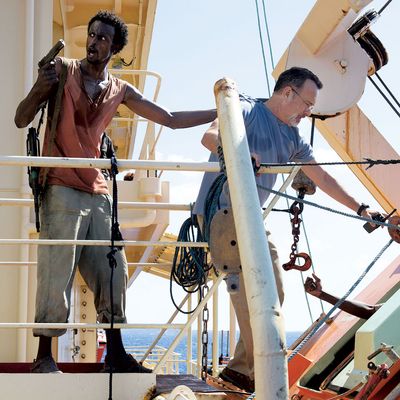
The most startling image in the fact-based hostage thriller Captain Phillips is the near-skeletal physiognomy of the actor Barkhad Abdi, who plays Muse, the self-appointed “captain” of a band of Somali pirates attempting to hijack a cargo ship. Abdi looks starved, his skin drawn tightly over his cheekbones, his face tapering sharply toward the base like a lightbulb. In the context of mainstream American cinema, he’s “the alien other.” He’s the Scary Black Man who haunts white America’s most xenophobic dreams. The triumph of the actor and the director, Paul Greengrass, is that, over the next two hours, we come to feel as deeply for Muse as for his hostage played by all-American nice-guy superstar Tom Hanks. Captain Phillips is not just a liberal-guilt movie. Greengrass and screenwriter Billy Ray put us on the side of Phillips, his crew, the American negotiators, the Navy, and the SEALS. But we understand the greater tragedy of Muse and the Somalis’ lives. We hate the world that fomented this bloody confrontation.
The movie ends smashingly—and opens lamely, loitering around Phillips’s Vermont home. Greengrass didn’t invent the faux-documentary style in which every scene is shot with a shaky handheld camera, but he used it to create a newsreel-like present tense in Bloody Sunday and parts of United 93, and he made it hugely commercial in the second and third Bourne pictures. Alas, he’s now a one-trick pony. Why is the camera quivering behind Hanks’s neck as Phillips and his wife (the underused Catherine Keener) drive to the airport? Does he think it’s the only way we’ll accept the movie’s realism? The realism flies out the window with the sound of Hanks’s disconcerting New England accent and signpost lines like, “The wohld’s movin’ so fahst.” (WARNING: GLOBALIZATION PERILS AHEAD.) The scenes in Somalia—in which a warlord and his machine-gun-toting underlings order Muse to capture a ship—are as crudely drawn as in a Stallone picture. The lack of imagination is dispiriting.
It isn’t until a dot appears on the radar screen of the Maersk Alabama that the narrative vise begins to tighten. A speeding boat with four men holding guns is an irrationally terrifying sight, and the way Greengrass shoots the Somalis crashing into “our” space triggers our fight-or-flight instinct. (Questions for thought: What successful thrillers these days don’t trigger our fight-or-flight instinct? Has neurochemistry entirely taken the place of artistry?) The crew has until now seemed a ragtag, halfhearted bunch (“They’re not payin’ me enough to fight pirates!”), but they come together in a taut game of hide-and-seek around the ship. One of the Somalis is a kid out of his depth, another a sadist itching to kill. Muse is the center who cannot guarantee he’ll hold. He assures Phillips that “everything’s gonna be okay.” But he can’t, he says, go home with less than millions.
It’s when the Somalis spirit Phillips away in a closed lifeboat that Captain Phillips becomes a great thriller, in part because Barry Ackroyd’s camera is stuck inside with the characters and its jitters finally seem earned. This is also where Hanks attains a new stature as an actor. Part of me will always miss the high-energy clown with the best fastball of any light comedian—and lament the awards-friendly move to Inspire and Enlighten. But the way he disappears into the character here is unprecedented. The performance is internal, but we’re guided by the flickers of his eyes. When Phillips is paralyzed with fear as his life seems about to end, Hanks makes us hate his captors. When Phillips tells them there’s no way they can win and gazes on them with pity, he makes us see the larger horror of their situation. Phillips isn’t trying to save their lives out of pure altruism—he knows there’s a good chance that if they die, he will. His emotions are all mixed up, especially when Abdi’s Muse speaks tenderly of moving to America and buying a car. The Somali is so young, so naïve, and yet so dangerous.
Most kidnap thrillers have throwaway denouements, but the most overpowering scene in Captain Phillips comes after the climax, in the infirmary. It’s where we’re supposed to exhale but can’t, fully. It’s where the phrase “Everything’s going to be okay” is both a balm and a sting, a reminder of American military might—and of a world that is closer and more desperate than ever, its emblem the face of a man called Muse.
Captain Phillips. Directed by Paul Greengrass. Sony. PG-13.
*This article originally appeared in the October 14, 2013 issue of New York Magazine.


